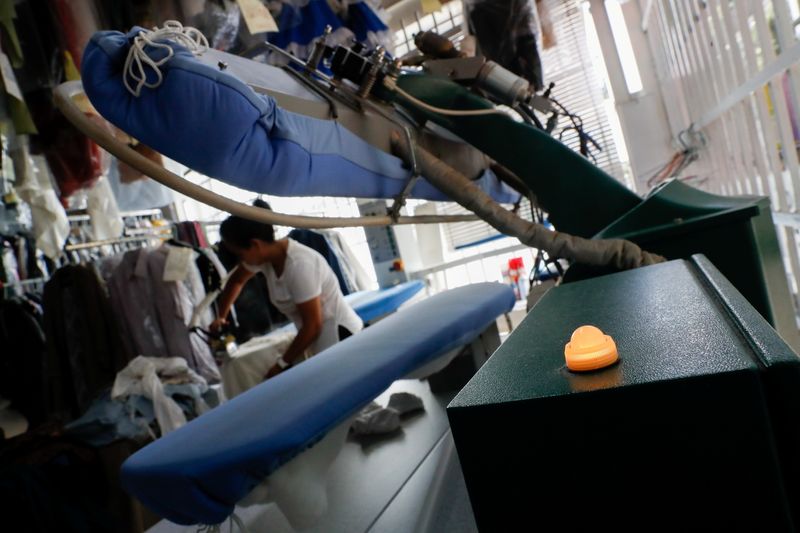MADRID (Reuters) – Surging natural gas prices across Europe could hinder the economic recovery in Spain, where small businesses crucial to local employment are more exposed than elsewhere on the continent to steep rises in power bills.
Energy bills have more than doubled in Spain and other European countries as gas prices rocket on factors such as low storage stocks, tipping companies into crisis and forcing governments to come up with measures to cushion the blow.
The fallout from record high gas prices has hit even food producers as suppliers of carbon dioxide – used in the vacuum packing of food products to extend their shelf life and to put the fizz into beer and soft drinks – seize up.
Spain is particularly exposed to the spike in household fuel bills due to a high share of customers with flexible tariffs, which are sensitive to price movements, analysts say.
Small businesses, which account for a disproportionately high 61.3% of Spanish economic activity and 71.9% of total employment, are suffering especially.
Less able than large corporations to weather the high prices, they say they are struggling to invest in re-hiring and expansion as the economy emerges from the COVID-19 pandemic which saw gross domestic product shrink a historic 10.8% in 2020.
“We can hardly cover expenses,” said Mayra Maldonado, 41, who runs a historic dry cleaning shop in the centre of Madrid with her partner, Gladys Mariscal.
“In a pre-COVID August, we had a turnover of 6,000 euros and about 600 euros of power bill. This August we have made 3,000 euros and we paid 1,050 euros for electricity.”
Maldonado worked through an August heatwave when the temperature routinely exceeded 40 degrees Celsius with hardly any air conditioning in an effort to keep down bills in a business needing electrical appliances during peak hours.
After working as an employee for 15 years she took over the business in March 2020, a few days before the first major lockdown was imposed.
“We have a turnover 40% of what this dry cleaner was making, remote work has affected us a lot.”
POTENTIAL SAVINGS DRAIN
Recent indicators pointed to a solid revival of the economy, as high vaccination rates bolstered activity and tourists flocked to sunny destinations over the summer. The government expects the economy to rebound to pre-pandemic levels by the end of 2021.
However, the recovery so far has been heavily dependent on spending by consumers who are now facing 35% annual rises in their power bills.
That could drain 20 billion euros in savings for households and small businesses, according to estimates by Raymond Torres, chief economist of the Funcas thinktank
“The impact of the power hike comes after a terrible crisis. It is not the same to assume these costs now than in 2019,” said Luis Aribayos, secretary general of Spain’s association of small and medium-sized companies.
The Bank of Spain, in line with the European Central Bank, said the rise is temporary and will not affect the economy. But analysts reckon that even if transitory, this will erode profit margins and competitiveness.
“Small businesses have had to empty the coffers and go into debt. They can’t take it anymore,” Aribayo said.
The government approved last week an emergency package to mitigate the rise in prices, reducing taxes and putting a cap on gas, so that it does not pick up all the increase in the wholesale markets.
Italy and Greece are in a similar position and are looking for Spanish-style solutions to prevent sudden price rises from hitting consumers’ pockets. Britain too is mulling support for energy companies and has warned that more of its energy suppliers could be forced out of business.
For the time being, Spanish businesses – who could see the impact of the government salve in upcoming bills – have decided to absorb these increases and not pass them on to their customers, slowing the inflationary spiral.
“Prices can’t be touched, they can’t be raised. If you go up 50 cents, the customer leaves. But for us, the increase in electricity is much more. We have not touched prices for five years,” said Maldonado.
Torres estimates that inflation will reach 4.5% by the end of the year, the highest in more than a decade, and said that although transitory, the impact on the recovery will have a negative impact.
“The rise in prices is more pronounced in Spain than in Italy and France, even exceeding euro zone inflation and that is not a positive element for our competitiveness,” said Alicia Coronil, chief economist at Singular Bank, also warning of a deterioration in consumer sentiment.
(Reporting by Belén Carreño; Editing by Emelia Sithole-Matarise)



















